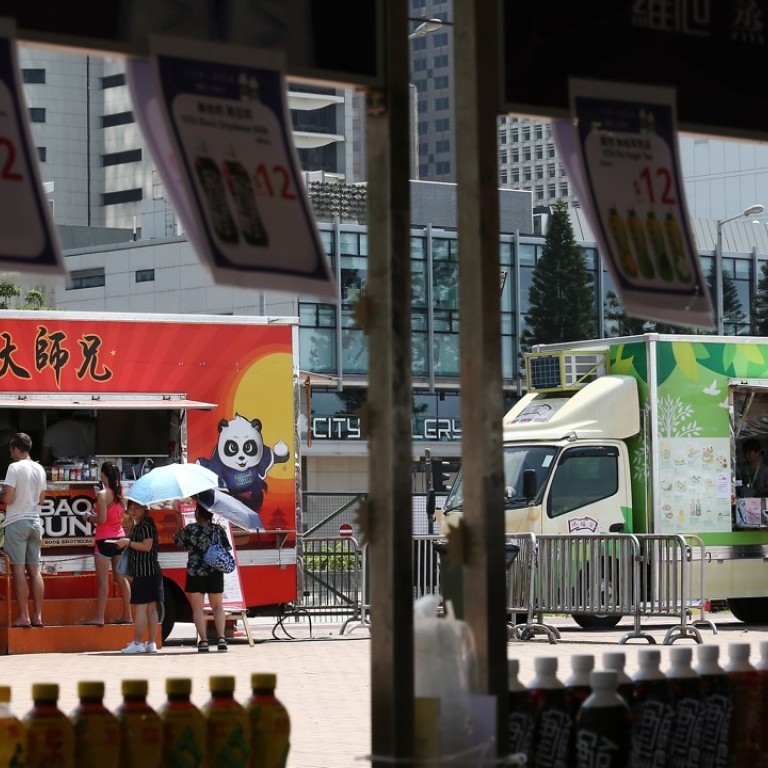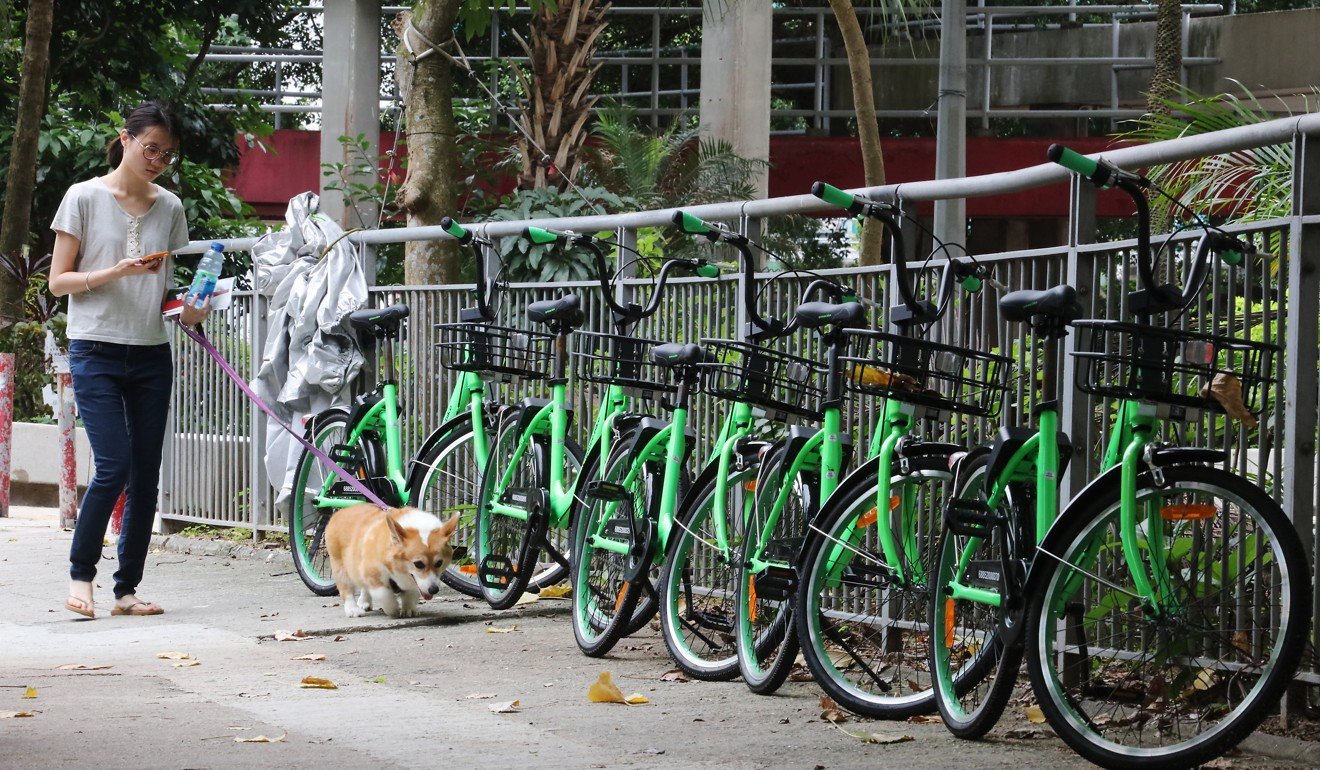
Online Letters, June 20, 2017
Food trucks helping neither small business nor local culture
I am writing to express my views on whether food trucks benefit Hong Kong.
Roaming food trucks are meant to offer high-quality, low-cost and interesting local food. Hong Kong is famed as a “food paradise”. Hong Kong people love food. Visitors are always looking for new eateries. However, I don’t think food trucks will work in Hong Kong.
I think the government is trying to use this scheme to shrink the business of street hawkers
Seen as a boost to the tourism industry, the food trucks did good business in the initial days, with people queueing for hours to try this new trend. However, this trend will not last, as the menus on offer are not totally focused on local favourites. In the short run, food trucks may attract people to have a try, but foreign tourists will not be tempted to try something they already have in their own country.
Again, locals may be put off if they have to wait for a long time for their orders, which doesn’t suit this fast-paced society.
Also, I believe bringing Western cultures into Hong Kong may destroy its unique culture, which is in the collective memory of its people, namely, street hawking.
I think that the government is trying to use this scheme to shrink the business of street hawkers as they are not giving out licences any more and actually took action to remove hawkers. Officials are saying food trucks are more hygienic. I am sure that the culture of street hawking is irreplaceable in the hearts and minds of Hong Kong citizens. If I were the government, I would have a better plan for the street hawkers rather than forcing them to leave. I would provide them with a licence if they passed quality tests.
Also, the food truck scheme was advertised as being aimed at helping small businesses. But what I see is that big companies have got the licence to run food trucks, as small businesses have not been able to afford the high price of starting up. I see little benefit, then, for them. The high price of launching a truck has naturally caused the prices of their food to be high as well, and many customers may find such items too expensive. It isn’t low-cost food; it may be quality and interesting food, but it isn’t affordable food for most Hong Kong people.
Food truck scheme sees second Hong Kong operator drop out
Some people appreciate this scheme for providing fusion food, which suits their taste. But it is not my cup of tea, as I prefer more local food and local flavours, and I am sure there are many like me.
I hope that the government will work to preserve our unique Hong Kong culture. Once the unique culture vanishes, our future generations will never have a chance to experience it.
So while food trucks may benefit Hong Kong in making profit for the tourist industry for now, it is making little contribution to our unique Hong Kong culture. We should strike a balance between profits and cultural conservation.
Sharon Cheng, Yau Yat Chuen
Being a copycat is good only if it works
The food truck scheme in Hong Kong has been presented as a groundbreaking idea, but the essence of the business is the same as our former street hawkers: a food kiosk that can move around depending on the situation, be it weather, demand, festivals, or any other related factors.
The truck itself is so mobile and self-sufficient that it should give its owner a very good platform to do business.
Hong Kong is very famous for its street food, and we have a proud history of street hawkers. The food truck is indeed a good way to revamp this tradition and to take it to a whole new level. Also, given the soaring rents in the city and the better hygiene standards such mobile eateries provide, food trucks actually have the potential to thrive in Hong Kong.
However, our food truck project is turning out to be a joke. Rigid regulations present hurdles for small entrepreneurs to get in the fray, and prevent existing operators from fully utilising the real advantage of having a truck – the mobility. The greatest problem of our government lies not in being a copycat – since imitating the good qualities of other countries could be a profitable idea – but in copying only the form but not the essence.
Victoria So Wan-tung, Tsuen Wan
Bike-sharing trend is not without its pitfalls
Many citizens like to ride a bike in their leisure time, and the appearance of the Gobee bike-sharing app is definitely a welcome event.
It provides a choice of transportation that is environmentally friendly, and their bikes can also be easily found and parked. At just HK$5 for 30 minutes, it is cheap for leisure use.
However, I believe there are more cons than pros. As most users probably only go cycling to pass the time, they may be unversed in the necessary rider etiquette or lack the proper gear. They may not have protection such as a helmet and pads, and these cannot be borrowed. This increases the risks for riders.

Moreover, given the lack of cycling tracks in Hong Kong, riders may need to use the roads, which is very dangerous. People can now find a bike everywhere, including busy areas like Wan Chai. Given the high density of vehicles and pedestrians in urban areas, accidents could easily take place.
Bikes may also block public spaces, as they can be parked anywhere.
The quality of bikes is another concern. If riders rent a bike that is broken without knowing, it will increase the risk of accident.
The etiquette that a bike rider must practice, like hand signals, may not be known to the general public, who may also not know that they need to wear brightly coloured clothes and protective gear. Not following such riding rules may cause misunderstandings with other road users, and increase the chances of injury.
Donald Wong, Tseung Kwan O
Stop the buying for the poaching to stop
We are writing to you about a matter that worries us very much, as well as thousands of other human beings all over the world. It is the comprehensive, completely meaningless, poaching going on in Africa and Asia, with thousands of elephants, tigers and rhinos killed every day to satisfy Asian consumers’ “need” for ivory from elephants, powdered horn from rhinos, and powdered teeth and bones from tigers.
These killings take place because of superstition and greed. It is hideous, it is outrageous, it is an enormous disaster.
These animals have for a very long time been in danger of being exterminated because of unscrupulous poachers. All that matters to such people is money.
As long as Chinese consumers, as well as other Asian buyers, do not understand that they are exterminating these animals because of superstition and greed – and as long as they do not care if wild animals live or die – so, the completely meaningless, massive poaching in Africa and Asia will continue.
How long must this go on? Something must be done – consumers must realise that they are the only ones that can stop this terrible killing.
Only if people stop buying ivory, teeth, bones and horn from wild animals can the scourge of poaching be exterminated.
Karin Sorensen, Vincent Jensen, Gert Thogersen
Galten, Denmark
Ma On Shan food markets failing to deliver
As far as I can tell as a resident of Ma On Shan for over two decades, the district does not have a single food market run by the Food and Environmental Hygiene Department.
In fact, Ma On Shan only has private food markets in operation, and a vast majority of residents would think the food sold is too expensive. Many also think the sanitary conditions of most markets are substandard, or even bad.
On top of that, most of the private markets are located in shopping arcades in the estates, and the food choice is limited. Management rights of some are outsourced to new institutions, with markets refurbished before subletting. Adding the cost of restoration to the new rent would mean it would be two or three times higher. Small-scale stall entrepreneurs will, to avoid taking on all of the added financial burden, naturally transfer most or all of it to customers, in the form of even higher prices.
A survey by a local labour union found most respondents would welcome a new food market run by the Food and Environmental Hygiene Department, to allay worries about skyrocketing food prices and to see more sanitary conditions at the food markets. I, for one, would be delighted if this happens.
Randy Lee, Ma On Shan

